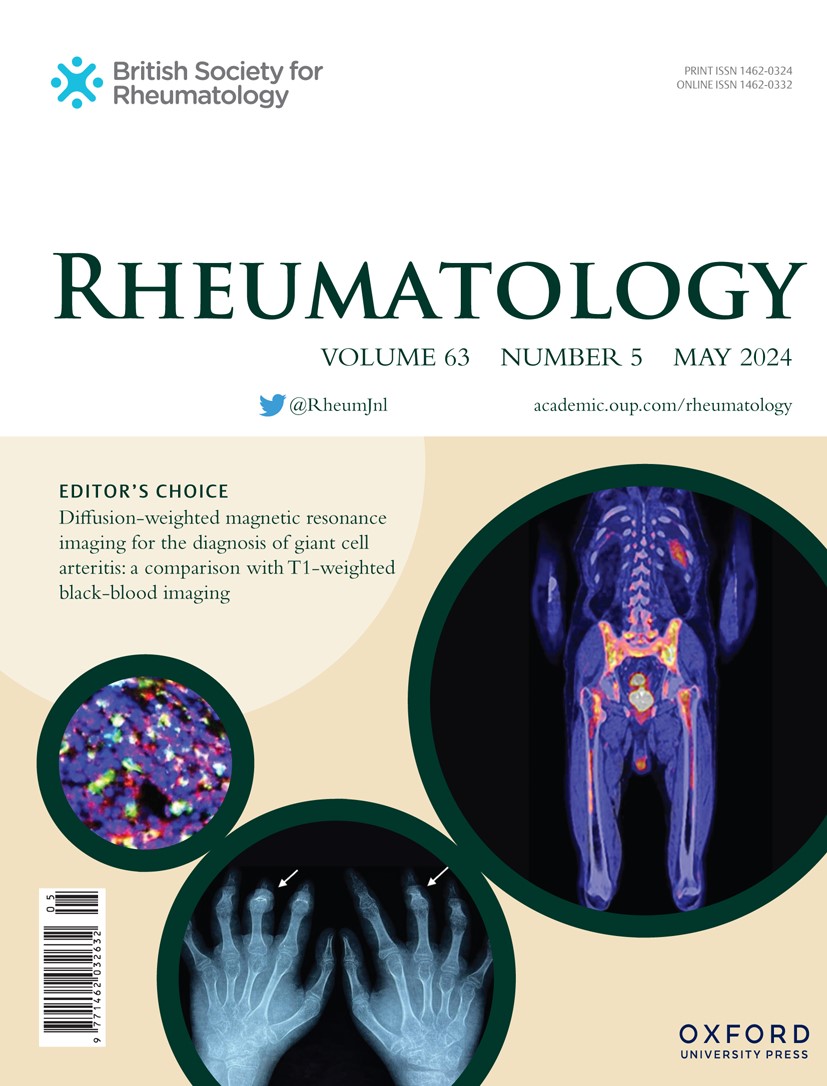PROMIS displays strong construct validity in pediatric and adult patients with idiopathic inflammatory myopathies.
IF 4.4
2区 医学
Q1 RHEUMATOLOGY
引用次数: 0
Abstract
OBJECTIVES We assessed the validity of Patient-Reported Outcome Measurement Information System (PROMIS) for juvenile and adult-onset idiopathic inflammatory myopathies (JIIM/IIM) and determined associations with disease characteristics and assessments. METHODS PROMIS-49 or -57 questionnaires were completed by parents (n = 70) and pediatric (n = 49) or adult patients with IIM (n = 61). Construct validity was evaluated using legacy health-related quality of life (HRQoL) instruments and associations with disease assessments and clinical characteristics. RESULTS All groups reported decreased Physical Function (PF) (39.9-44.3, p< 0.001-0.002) compared with the reference population. All groups also reported significantly increased pain interference (49.6-55.8, p< 0.001), fatigue (49.5-55.1, p< 0.001-0.004), and anxiety (47.0-52.5, p< 0.001-0.043). PROMIS demonstrated excellent internal consistency (α > 0.9) and construct validity with legacy HRQoL instruments. Parents reported worse PF (39.7 vs 42.9, p< 0.001), more Fatigue (52.4 vs 48.5, p= 0.023), and higher Anxiety (49.6 vs 46.8, p= 0.032) than their children. PROMIS PF correlated best with disease activity measures (|r|=0.022-0.636), whereas Social Role, Anxiety, and Depression correlated poorly with disease activity measures. Multiple PROMIS domains correlated with Patient and Parent Global Damage, but only parent PF correlated with Physician Global Damage (|r|=0.414). Several PROMIS domains had better correlations with disease assessments than the Medical Outcomes Study Short Form-36 (SF-36). CONCLUSION PROMIS offers a nuanced view of HRQoL that traditional disease assessments do not adequately capture. PROMIS has good construct validity, and it may be more sensitive than legacy HRQoL measures. These findings support the incorporation of PROMIS into the assessment of IIM/JIIM to address comprehensive patient well-being.PROMIS在患有特发性炎性肌病的儿童和成人患者中显示出很强的结构效度。
目的:我们评估了青少年和成人发病的特发性炎症性肌病(JIIM/IIM)的患者报告结果测量信息系统(PROMIS)的有效性,并确定了与疾病特征和评估的相关性。方法由父母(n = 70)和儿童(n = 49)或成人IIM患者(n = 61)分别填写promise -49或-57份问卷。使用遗留健康相关生活质量(HRQoL)工具以及与疾病评估和临床特征的关联来评估结构效度。结果与参考人群相比,所有组的身体功能(PF)均下降(39.9 ~ 44.3,p< 0.001 ~ 0.002)。所有组均报告疼痛干扰(49.6-55.8,p< 0.001)、疲劳(49.5-55.1,p< 0.001-0.004)和焦虑(47.0-52.5,p< 0.001-0.043)显著增加。PROMIS与传统HRQoL仪器具有良好的内部一致性(α > 0.9)和结构效度。父母报告的PF(39.7比42.9,p< 0.001)、疲劳(52.4比48.5,p= 0.023)和焦虑(49.6比46.8,p= 0.032)比他们的孩子更严重。PROMIS PF与疾病活动度指标相关性最好(|r|=0.022-0.636),而社会角色、焦虑和抑郁与疾病活动度指标相关性较差。多个PROMIS结构域与患者和父母的全局损伤相关,但只有父母的PF与医生的全局损伤相关(|或|=0.414)。几个PROMIS结构域与疾病评估的相关性优于医学结果研究简表36 (SF-36)。结论:promis提供了传统疾病评估无法充分捕获的HRQoL的细微差别观点。PROMIS具有良好的结构效度,可能比传统的HRQoL测量更敏感。这些发现支持将PROMIS纳入IIM/JIIM评估,以解决全面的患者福祉。
本文章由计算机程序翻译,如有差异,请以英文原文为准。
求助全文
约1分钟内获得全文
求助全文
来源期刊

Rheumatology
医学-风湿病学
CiteScore
9.40
自引率
7.30%
发文量
1091
审稿时长
2 months
期刊介绍:
Rheumatology strives to support research and discovery by publishing the highest quality original scientific papers with a focus on basic, clinical and translational research. The journal’s subject areas cover a wide range of paediatric and adult rheumatological conditions from an international perspective. It is an official journal of the British Society for Rheumatology, published by Oxford University Press.
Rheumatology publishes original articles, reviews, editorials, guidelines, concise reports, meta-analyses, original case reports, clinical vignettes, letters and matters arising from published material. The journal takes pride in serving the global rheumatology community, with a focus on high societal impact in the form of podcasts, videos and extended social media presence, and utilizing metrics such as Altmetric. Keep up to date by following the journal on Twitter @RheumJnl.
 求助内容:
求助内容: 应助结果提醒方式:
应助结果提醒方式:


